Famous Women throughout the through the winding corridors of time. Our shared history has been illuminated by the presence of women whose intellect have redrawn the boundaries of what’s achievable.
We’re speaking of the women who didn’t just step outside the box but dismantled it entirely.
These women, and countless others, didn’t just “do the damn thing”—they rewrote the damn playbook.
Their legacies are not just footnotes in history books but are living, breathing inspirations that compel us to press forward.
This is why we need to know the stories of these 100 remarkable women who have changed history!
That being said, we also need to understand patience, art, and unique traditions around the world!
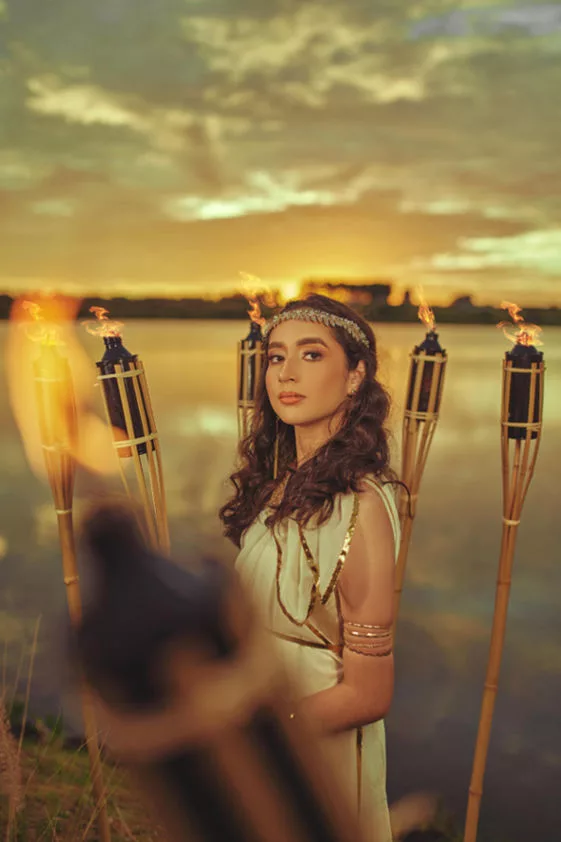
Let’s dive into the 100 famous women who changed the world!
- 1. Sappho
- 2. Cleopatra
- 3. Boudica
- 4. Hypatia
- 5. Joan of Arc
- 6. Artemisia Gentileschi
- 7. Sor Juana Inés de la Cruz
- 8. Mary Wollstonecraft
- 9. Jane Austen
- 10. Mary Seacole
- 11. Elizabeth Cady Stanton
- 12. Ada Lovelace
- 13. Queen Victoria
- 14. Florence Nightingale
- 15. Susan B. Anthony
- 16. Clara Barton
- 17. Harriet Tubman
- 18. Mary Anning
- 19. Sojourner Truth
- 20. Marie Laveau
- 21. Margaret Sanger
- 22. Emmeline Pankhurst
- 23. Coco Chanel
- 24. Eleanor Roosevelt
- 25. Virginia Woolf
- 26. Gertrude Bell
- 27. Agatha Christie
- 28. Hedy Lamarr
- 29. Dorothy Hodgkin
- 30. Simone de Beauvoir
- 31. Frida Kahlo
- 32. Indira Gandhi
- 33. Rosalind Franklin
- 34. Golda Meir
- 35. Ruth Bader Ginsburg
- 36. Margaret Thatcher
- 37. Rosa Parks
- 38. Amelia Earhart
- 39. Rachel Carson
- 40. Coretta Scott King
- 41. Shirley Chisholm
- 42. Barbara McClintock
- 43. Mother Teresa
- 44. Billie Holiday
- 45. Marie-Thérèse Walter
- 46. Grace Hopper
- 47. Malala Yousafzai
- 48. Benazir Bhutto
- 49. Maya Angelou
- 50. Wangari Maathai
- 51. Angela Merkel
- 52. Sally Ride
- 53. Ellen Johnson Sirleaf
- 54. Oprah Winfrey
- 55. Aung San Suu Kyi
- 56. Elizabeth Blackwell
- 57. Diana, Princess of Wales
- 58. Shirin Neshat
- 59. Aung San Suu Kyi
- 60. Elizabeth Blackwell
- 61. Diana, Princess of Wales
- 62. Sandra Day O’Connor
- 63. Ellen DeGeneres
- 64. Gloria Steinem
- 65. Hildegard von Bingen
- 66. Serena Williams
- 67. Florence Pugh
- 68. Rachel Corrie
- 69. J.K. Rowling
- 70. Shirin Ebadi
- 71. Misty Copeland
- 72. Yayoi Kusama
- 73. Tarana Burke
- 74. Greta Thunberg
- 75. Indra Nooyi
- 76. Valentina Tereshkova
- 77. Toni Morrison
- 78. Sacagawea
- 79. Malinalli Tenépatl
- 80. Wang Zhenyi
- 81. Audrey Hepburn
- 82. Aretha Franklin
- 83. Margaret Hamilton
- 84. Madeleine Albright
- 85. Toni Collette
- 86. Chimamanda Ngozi Adichie
- 87. Jane Goodall
- 88. Temple Grandin
- 89. Marta Vieira da Silva
- 90. Ellen Ochoa
- 91. Anne Frank
- 92. Mother Jones
- 93. Jhumpa Lahiri
- 94. Rita Levi-Montalcini
- 95. Helen Keller
- 96. Gabriela Mistral
- 97. Annie Oakley
- 98. Mae Jemison
- 99. Kamala Harris
- 100. Mary Barra
List of 100 Famous Women in History
1. Sappho
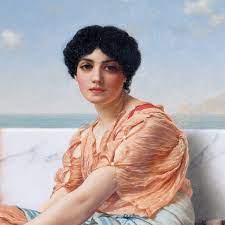
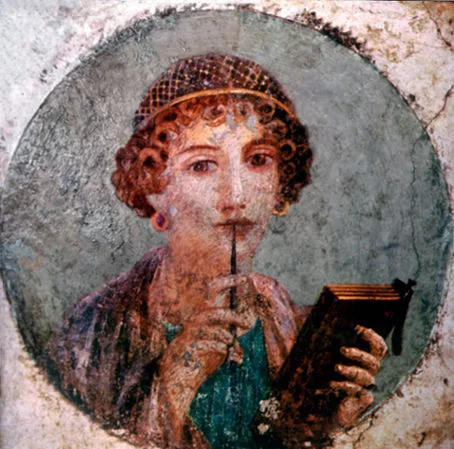

The Famous Woman of Ancient Greece
Sappho, born around 630 BCE on the island of Lesbos. She stands as an iconic figure in the realm of ancient Greek poetry. Renowned for her lyricism and eloquence, Sappho’s contributions to literature have left an indelible mark on the cultural landscape.
Often referred to as the “Tenth Muse,” she was a trailblazer in the male-dominated world of ancient Greek literature. Sappho’s poems, though fragmented over time, resonate with themes of love, desire, and the complexities of human emotion. Above all, her innovative use of vivid imagery influenced poets in her time and laid the foundation for lyric poetry.
Sappho’s enduring legacy extends beyond her verses. Her life and work continue to inspire generations. Making her an integral part of the pantheon of women who have profoundly shaped the world. Sappho’s poetic brilliance and cultural impact make her an essential figure among the 100 famous women who changed the world.
2. Cleopatra
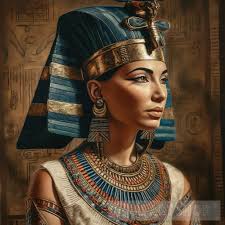
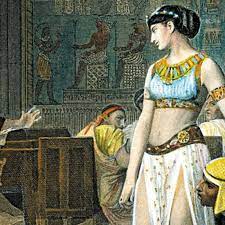

The Last Pharaoh of Ancient Egypt
Cleopatra VII, famed for her intellect, beauty, and political acumen, remains one of the most searched historical figures online. She was the last active ruler of the Ptolemaic Kingdom of Egypt. Yet she is best known for her relationships with Roman rulers Julius Caesar and Mark Antony.
Cleopatra’s life story of both power, romance, and tragedy has been the subject of countless works of art and literature. It has secured her a place as a perpetual figure of fascination in world history. Cleopatra’s political and cultural influence position her as one of the most famous women in history.
3. Boudica
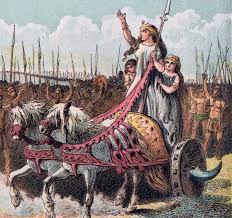

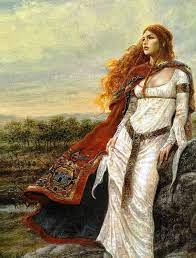
Famous Warrior Queen of the Iceni
Boudica, the fierce and formidable warrior queen of Iceni, remains a significant figure in British history and folklore. Her story unfolds in the early 1st century CE. During a period of intense conflict as the Roman Empire exerted its control over Britain.
Following the death of her husband, King Prasutagus, the Romans violated an agreement that should have protected Boudica and her daughters. In response, she led a major uprising against the occupying Roman forces around 60 or 61 CE. Although ultimately unsuccessful, Boudica’s rebellion was marked by its ferocity and scale. With her forces devastating several Roman settlements including Londinium (modern-day London).
Her legacy endures as a symbol of both resistance and bravery against oppression. Moreover, it paints a picture of a woman who dared to challenge the might of Rome. Boudica’s fearless leadership and indomitable spirit secure her place among the 100 famous women in history.
4. Hypatia
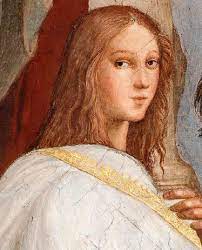
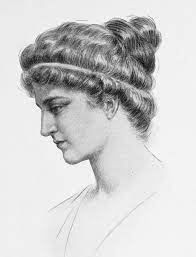
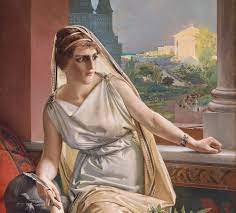
Mathematician and philosopher
Hypatia of Alexandria stands as one of the most prominent figures in the history of Western. Renowned for her achievements in mathematics, astronomy, and philosophy.
Moreover, living in the 4th and early 5th centuries CE in Alexandria, Egypt. Hypatia was a product of the Hellenistic intellectual tradition.
As a scholar at the Library of Alexandria, she taught a range of subjects including philosophy, mathematics, and astronomy. She contributed significantly to these fields, although much of her work has been lost to history.
Hypatia was also known for her construction of scientific instruments like astrolabes. Her tragic death at the hands of a Christian mob is seen as a symbol of the end of the Classical era.
Lastly, Hypatia’s legacy is that of a pioneering woman in science and philosophy, an enduring symbol of learning in a male-dominated world. Hypatia’s intellectual prowess to mathematics establish her as one of the most famous women.
5. Joan of Arc



The Famous Woman of Orleans
Joan of Arc’s heroism during the Hundred Years’ War between France and England has inspired millions. A peasant girl who believed she was acting under divine guidance, she led French armies to several important victories.
Captured and burned at the stake by the English at just 19. She was later canonized as a saint, and her legacy as a fearless leader of French unity continues to resonate. Joan of Arc’s heroic deeds and unwavering faith distinguish her as one of the famous women whose legacy continues to inspire.
6. Artemisia Gentileschi


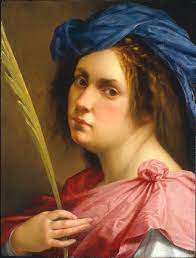
Baroque Painter
Artemisia Gentileschi was a trailblazing female painter during the Baroque period, a time when the art world was overwhelmingly male-dominated. Born in Rome in 1593, she was trained by her father, Orazio Gentileschi, himself a notable painter.
Artemisia quickly developed a style characterized by dramatic use of light and color. As well as a unique approach to depicting female subjects, often from mythology and the Bible.
Her works, such as “Judith Slaying Holofernes” are celebrated for their powerful portrayal of women. Gentileschi’s life was marked by personal trauma, including a well-documented trial following her sexual assault.
Lastly, her determination to succeed in an art world that was unforgiving to women have made her a feminist icon. Artemisia Gentileschi’s artistic talent make her a prominent figure among the famous women who have shaped the art world.
7. Sor Juana Inés de la Cruz


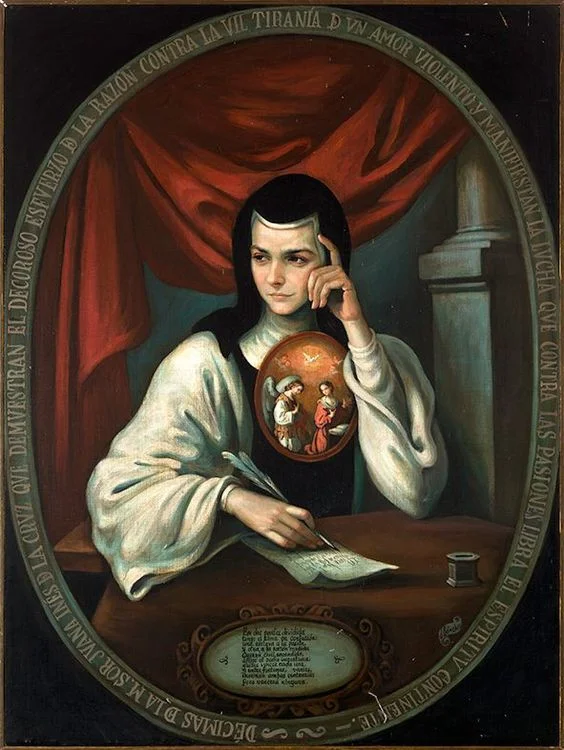
Writer and Nun
Sor Juana Inés de la Cruz was a self-taught scholar and poet of the Baroque school. Furthermore she was a nun of the Hieronymite order in New Spain (modern-day Mexico).
Born in 1648, she was known for her intelligence from a young age. She became a lady-in-waiting at the viceroy’s court, where she received an education, a rarity for women of her time.
She later chose to become a nun, which allowed her to continue her studies and writing. Sor Juana is best known for her poetry, plays, and essays that tackled topics such as love, feminism, and religion.
Her most famous work, “Respuesta a Sor Filotea,” is a bold defense of women’s rights to education. The advocacy for women’s intellectual rights have cemented her status as a key figure in the Latin American literary. With her literary brilliance position her as one of the most famous women, celebrated among the 100.
8. Mary Wollstonecraft


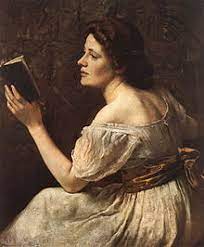
The Mother of Feminism
Mary Wollstonecraft is often hailed as the founder of feminist philosophy. Her seminal work: “A Vindication of the Rights of Woman” (1792), argued for women’s education and the rationality of the sexes. All together challenging the societal norms of the 18th century.
Lastly, her writings laid the groundwork for the women’s rights movements. That followed, making her a key figure in discussions about women’s history and gender equality. Her pioneering advocacy for women’s rights establishes her as a central figure among the 100 famous women who championed societal change.
9. Jane Austen
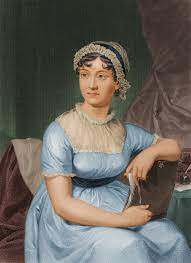

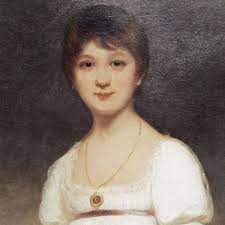
Famous Woman Novelist
Jane Austen, an English novelist, is revered for her six major novels which interpret, critique, and comment upon the British landed gentry at the end of the 18th century.
Born in 1775, Austen’s works, including ‘Pride and Prejudice’, ‘Sense and Sensibility’, and ‘Emma’, are renowned for their realism. Biting social commentary, and masterful use of irony and wit. Despite the limited social mobility for women at the time, her works deftly explore the dependence of women. Especially on marriage for social standing and economic security.
Austen’s novels have a timeless appeal, offering keen insights into human relationships that remain relevant today. Her writing has earned her a place as one of the most widely read and beloved authors in English literature, as well as one of the most famous women in history. Jane Austen’s literary legacy and timeless novels secure her place as one of the most famous women, revered among the 100 who have shaped literature.
10. Mary Seacole



Pioneering Nurse and Heroine of the Crimean War
Mary Seacole was a British-Jamaican nurse and businesswoman who is best known for her brave service during the Crimean War. Born in 1805 in Kingston, Jamaica, she learned her nursing skills from her mother, who kept a boarding house for invalid soldiers.
Despite facing racial prejudice, she traveled to Crimea and established the “British Hotel,” where she provided care and comfort to wounded soldiers. Seacole’s autobiography, “Wonderful Adventures of Mrs. Seacole in Many Lands” (1857), is one of the earliest autobiographies of a mixed-race woman.
Lastly, Mary Seacole’s contributions to nursing and her courage in the face of adversity make her an indispensable part of the 100 famous women who transformed healthcare.
11. Elizabeth Cady Stanton



Famous Women’s Rights Activist
Elizabeth Cady Stanton was a pioneering figure in the early women’s rights movement in the United States. Born in 1815, she played a significant role in initiating the first women’s rights and suffrage movements in the U.S.
Stanton was one of the organizers of the 1848 Seneca Falls Convention, the first convention to be called for the purpose of discussing women’s rights, and she co-authored the Declaration of Sentiments, a foundational text in the fight for women’s suffrage.
Her partnership with Susan B. Anthony was crucial to the women’s suffrage movement, and she was known for her oratorical and writing skills. Stanton’s work paved the way for future generations in the struggle for women’s rights.
Elizabeth Cady Stanton’s tireless advocacy for women’s rights solidifies her position among the 100 famous women who paved the way for gender equality.
12. Ada Lovelace
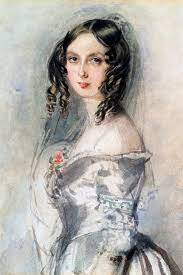
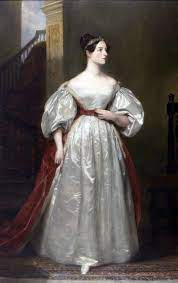

Mathematician and Writer
Ada Lovelace, born in 1815, excelled in math and writing. She is known for her work on Charles Babbage’s Analytical Engine, the proposed mechanical computer.
Lovelace recognized the machine’s potential for tasks beyond calculation, such as composing music. Her notes feature the first algorithm intended for machine processing, making her the first computer programmer.
Lastly, Lovelace’s vision exceeded her time, laying the groundwork for modern computing. Her pioneering work cements her status among famous women who revolutionized technology and computation.
13. Queen Victoria



Long-Reigning British Monarch
Queen Victoria, born in 1819, ruled the United Kingdom from 1837 until her 1901 death. Her 63-year reign, the Victorian era, remains the longest of any British monarch. Queen Elizabeth II surpassed it later.
Victoria, one of history’s most recognized women, oversaw significant changes in culture, industry, politics, science, and the military. She became the first Empress of India and witnessed the expansion of the British Empire.
Her personal character, lengthy widowhood, and strong moral sense created a royal mystique that still captivates today. Queen Victoria’s enduring influence on the British Empire places her among the world’s most famous women who shaped history.
14. Florence Nightingale



Founder of Modern Nursing
Florence Nightingale, born in 1820, pioneered modern nursing during the Crimean War. Managing trained nurses, she organized care for wounded soldiers, earning a favorable reputation.
Known as “The Lady with the Lamp,” Nightingale became an icon of Victorian culture. Her efforts formalized nursing education, establishing the world’s first secular nursing school in London.
Moreover, she revolutionized the 19th-century healthcare system, leaving an enduring impact. Florence Nightingale’s transformative influence on healthcare places her among the 100 famous women who revolutionized medical practices.
15. Susan B. Anthony

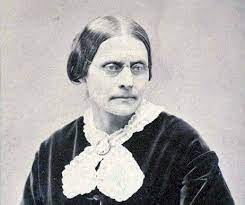

Women’s Suffrage Leader
Susan B. Anthony, born in 1820, was a pivotal figure in the women’s suffrage movement in the United States. She dedicated her life to social reform, advocating for women’s rights and the abolition of slavery. Anthony was a tireless and strategic organizer, speaker, and campaigner.
She played a critical role in various women’s suffrage activities, including co-founding the National Woman Suffrage Association with Elizabeth Cady Stanton. Above all, Anthony’s work laid the groundwork for the eventual passage of the 19th Amendment to the U.S. Constitution in 1920, which granted women the right to vote.
Lastly, her legacy as a key figure in the fight for women’s rights endures, symbolizing the ongoing struggle for gender equality. Susan B. Anthony’s relentless pursuit of women’s suffrage secures her place as one of the 100 famous women who fought for the right to vote.
16. Clara Barton


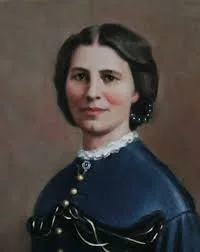
Founder of the American Red Cross
Clara Barton, born in 1821, was a pioneering nurse and humanitarian best known for founding the American Red Cross. She earned widespread recognition during the American Civil War, where she served as a hospital nurse, providing vital assistance on the front lines.
Her experiences during the war motivated her to campaign for the U.S. to ratify the Geneva Convention, which led to the formation of the American Red Cross in 1881. Barton served as its first president and led the organization in assisting disaster relief efforts both domestically and internationally.
Lastly, her dedication to helping others in times of crisis has left an enduring impact on humanitarian aid work. Clara Barton’s humanitarian efforts and the establishment of the American Red Cross mark her as one of the 100 famous women who dedicated their lives to serving others.
17. Harriet Tubman



Abolitionist and Political Activist
Harriet Tubman, born around 1822, was an American abolitionist and political activist. Born into slavery, she escaped and conducted thirteen missions to rescue about seventy enslaved individuals through the Underground Railroad.
Tubman was active in the women’s suffrage movement. She served as an scout and spy for the Union Army during the American Civil War. Her brave efforts earned her the nickname “Moses”. This solidified her as one of the most famous conductors of the Underground Railroad.
Lastly, Tubman’s courageous work in the abolitionist movement places her among the 100 famous women pivotal in the fight against slavery.
18. Mary Anning



Pioneering Paleontologist
Mary Anning, born in 1799, was a British fossil collector and paleontologist. Known worldwide for her finds in Jurassic marine fossil beds at Lyme Regis, her discoveries influenced scientific thinking about prehistoric life.
Anning’s groundbreaking contributions include the first correctly identified ichthyosaur skeleton at age twelve. She also discovered the first two plesiosaur skeletons and the first pterosaur skeleton outside Germany.
Despite limited education and gender barriers, Anning is now recognized as a significant figure in paleontology. Above all, her work reshaped our understanding of Earth’s history, placing her among the 100 famous women who made lasting contributions.
19. Sojourner Truth
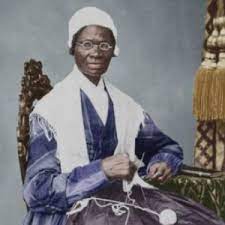

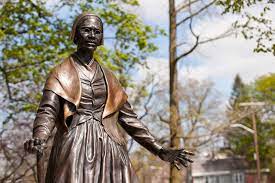
A Life of Activism
Born into slavery, Sojourner Truth escaped to freedom and became a prominent abolitionist and women’s rights activist. Her speech, “Ain’t I a Woman?” delivered at the Ohio Women’s Rights Convention in 1851, is a cornerstone in civil rights history.
Lastly, Truth’s unyielding fight for justice and equality has made her story a source of inspiration and a key subject of African American history studies. Her unwavering commitment to abolition and women’s rights makes her a central figure among the 100 famous women who left an indelible mark on social justice.
20. Marie Laveau

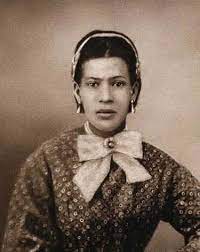
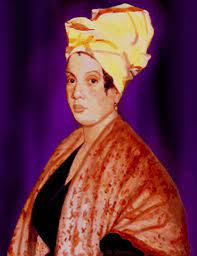
Influential Voodoo Practitioner in New Orleans
Marie Laveau, born in 1801, was a Louisiana Creole practitioner of Voodoo renowned in New Orleans. She was known as the “Voodoo Queen,” a title that indicates her prominence within the history of Vodou culture in the United States.
Laveau was a free woman of color and a powerful figure in the city, with a network that extended across all sectors of New Orleans society. She was known for her magical practices, as well as her work as a healer and herbalist. Her influence was so profound that she became a central figure of Louisiana folklore, and her legacy has been kept alive through stories, songs, and films.
Lastly, her life and work have contributed to her status as a cultural icon, representing a unique blend of African, French, and Creole traditions. Marie Laveau’s cultural influence and spiritual leadership in New Orleans position her as one of the 100 famous women who shaped the diverse tapestry of American history.
21. Margaret Sanger



Birth Control Advocate and Sex Educator
Margaret Sanger was an American birth control activist, sex educator, writer, and nurse. Born in 1879, she popularized the term “birth control” and worked towards its legalization and widespread acceptance.
Sanger opened the first birth control clinic in the United States and established organizations that evolved into the Planned Parenthood Federation of America. She faced strong opposition and frequent arrests for her advocacy but continued her fight, believing that women’s ability to control their reproduction was essential for women’s liberation and health.
Lastly, her work led to significant changes in public attitudes and laws regarding contraception, making her a pivotal figure in the reproductive rights movement. Her pioneering work in advocating for birth control and sex education secures her place among the 100 famous women who challenged societal norms.
22. Emmeline Pankhurst



Political Activist and Leader of the British Suffragette Movement
Emmeline Pankhurst was a British political activist and leader of the suffragette movement that fought for women’s rights to vote. Born in 1858, she founded the Women’s Social and Political Union (WSPU), an organization known for its militant tactics.
Above all, her leadership and her dedication to the cause of women’s suffrage were characterized by radical actions, including hunger strikes, large-scale public demonstrations, and even confrontations with the law. Her leadership in the suffragette movement in Britain marks her as one of the 100 famous women who fought relentlessly for women’s right to vote.
23. Coco Chanel



Fashion Designer and Businesswoman
Coco Chanel, born Gabrielle Bonheur Chanel in 1883, was a French fashion designer and businesswoman who revolutionized women’s fashion in the early 20th century. She is most famous for her timeless designs, iconic suits, and little black dresses.
Chanel was the founder and namesake of the Chanel brand, which redefined feminine style by introducing garments that were both stylish and comfortable, a stark contrast to the corseted fashion of the time. Her emphasis on simplicity and elegance in fashion has had an enduring impact on the way women dress and perceive style.
Lastly, Chanel’s life and work have made her an iconic figure in the fashion industry, symbolizing sophistication and empowerment. Her revolutionary contributions to fashion and entrepreneurship establish her as one of the 100 famous women who reshaped the world of style.
24. Eleanor Roosevelt



First Lady of the United States and United Nations Spokeswoman
Eleanor Roosevelt, born in 1884, served as the longest-serving First Lady of the United States (1933-1945). Renowned for her humanitarian efforts and civil rights advocacy, she reshaped the role of the First Lady by actively participating in American politics.
After her husband’s death, Roosevelt played a pivotal role in drafting the Universal Declaration of Human Rights as a United Nations delegate. Her advocacy for human rights and commitment to democracy established her as a towering figure in women’s leadership and activism.
Eleanor Roosevelt’s impactful role as a First Lady and her work with the United Nations position her among the 100 famous women who shaped global diplomacy.
25. Virginia Woolf



Modernist Author and Essayist
Virginia Woolf was an influential 20th-century modernist author and essayist, known for her innovative narrative techniques and insightful treatment of gender, politics, and psychology. Born in 1882, Woolf became a central figure in the Bloomsbury Group of intellectuals.
Her most famous works, such as “Mrs. Dalloway,” “To the Lighthouse,” and “Orlando,” are celebrated for their experimental approach to narrative structure and stream-of-consciousness style. Woolf’s essays, including “A Room of One’s Own,” advocate for both women’s independence and intellectual freedom.
Her work has had a significant impact on feminist theory and literature. Virginia Woolf’s literary genius and contributions to modernist literature make her an essential figure among the 100 famous women who transformed the literary landscape.
26. Gertrude Bell
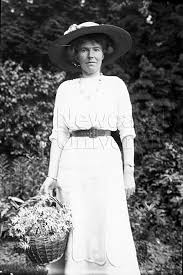
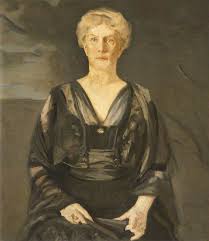

Writer, Archaeologist, and Political Officer
Gertrude Bell, born in 1868, was an English writer, archaeologist, and political officer. Her Middle East travels gave her extensive knowledge.
During World War I, she worked for the British government in Cairo. Bell played a key role in reshaping Arab states post-war, notably Iraq.
Her influence earned her the nickname “Queen of the Desert.” Bell’s writings offer insights into British imperial policy and Middle Eastern history.
Gertrude Bell’s multifaceted contributions in literature, archaeology, and politics secure her among the 100 famous women who left a lasting mark on history.
27. Agatha Christie



Writer Known for Her Detective Novels
Agatha Christie, born in 1890, was an English writer known for her 66 detective novels and 14 short story collections. Her creations include both the famous detectives Hercule Poirot and Miss Marple. Christie’s works, such as “Murder on the Orient Express” and “The Murder of Roger Ackroyd,” are renowned for their clever plots and surprising twists. She is one of the best-selling authors of all time, with her books selling billions of copies worldwide.
Christie’s work has had a lasting impact on the mystery and crime fiction genres, and she is often referred to as the “Queen of Mystery.” But above all, her mastery of detective novels and her enduring influence in the genre establish her as one of the 100 famous women who captivated readers worldwide.
28. Hedy Lamarr

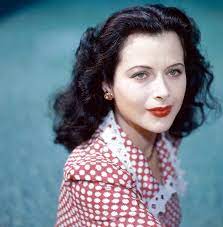

Actress and Inventor
Hedy Lamarr, born in 1914, was an Austrian-American actress and inventor. Transitioning from Hollywood stardom in the 1930s and 1940s, she co-invented frequency-hopping spread spectrum technology during World War II.
This invention laid the foundation for modern technologies like Wi-Fi, GPS, and Bluetooth. Her dual legacy as a celebrated actress and wireless communications pioneer illustrates a unique blend of creativity and technical brilliance. All challenging stereotypes about women in science and film.
Her dual achievements in both entertainment and technology position her among the 100 famous women who made significant contributions to both fields.
29. Dorothy Hodgkin



Nobel Prize-Winning Chemist
Dorothy Hodgkin, born in 1910, was a British chemist who won the Nobel Prize in Chemistry in 1964 for her work in the field of X-ray crystallography. She is best known for determining the structures of important biochemical substances, including penicillin, vitamin B12, and insulin.
Her research not only had a profound impact on chemistry and medicine but also paved the way for more detailed and accurate structural analysis of biomolecules.
Hodgkin remains one of the most notable female scientists of her time, known for her scientific achievements and her advocacy for science education and research. All in all, her groundbreaking work in chemistry and her Nobel Prize win mark her as one of the 100 famous women who advanced scientific knowledge.
30. Simone de Beauvoir



Writer, Intellectual, and Feminist
Simone de Beauvoir was a French writer, intellectual, existentialist philosopher, political activist, feminist, and social theorist. Born in 1908, she is best known for her seminal work “The Second Sex,” a detailed analysis of women’s oppression and a foundational tract of contemporary feminism. In it, she famously declared, “One is not born, but rather becomes, a woman,” exploring the nature of gender as a societal construct.
Her literary works, which include both novels, essays, and memoirs, often deal with themes of existentialism and feminism. De Beauvoir’s long-term relationship with philosopher Jean-Paul Sartre, and her significant influence in existentialism and feminism, make her a major figure in 20th-century philosophy and gender studies.
Simone de Beauvoir’s intellectual contributions to existentialism and her role in advancing feminist philosophy secure her place among the 100 famous women who shaped modern thought.
31. Frida Kahlo
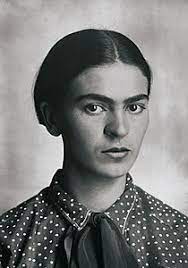


Painter and Artist
Frida Kahlo was a Mexican painter, born in 1907, renowned for her numerous portraits, self-portraits, and works inspired by the nature and artifacts of Mexico.
Her art is celebrated for its vivid color and poignant portrayal of pain and passion, largely drawn from her own personal experiences, including physical disability caused by a severe injury and emotional turmoil in her marriage. Kahlo’s works are rich with symbolism and often incorporate elements of Mexican folk culture.
She is admired not only for her technical skill but also for her unflinching exploration of identity, postcolonialism, gender, class, and race in Mexican society. Today, Kahlo is recognized as an icon of female creativity and a symbol of resilience and empowerment. This makes her a central figure among the 100 famous women who revolutionized the world of visual arts.
32. Indira Gandhi


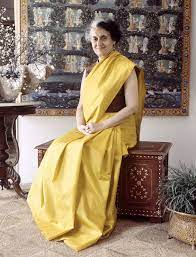
Prime Minister of India
Indira Gandhi, born in 1917, served as the Prime Minister of India and was the first and, to date, the only female Prime Minister of the country. The daughter of Jawaharlal Nehru, India’s first Prime Minister, she served as the leader of the Indian National Congress.
During her tenure from 1966 to 1977, and then again from 1980 until her assassination in 1984, she oversaw significant economic, social, and political changes in the country. Known for her political ruthlessness and unprecedented centralization of power, Gandhi’s leadership was marked by periods of both commendation and criticism. Her tenure saw India’s victory in the 1971 war with Pakistan, the testing of the first Indian nuclear weapon, but also the controversial imposition of a national emergency from 1975 to 1977.
Her assassination in 1984 led to significant repercussions in Indian politics. Indira Gandhi’s leadership as the first female Prime Minister of India positions her as one of the 100 famous women who made significant contributions to global politics.
33. Rosalind Franklin

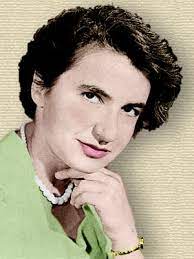
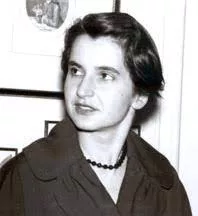
Chemist
Rosalind Franklin was a British chemist born in 1920, whose work was central to the understanding of the molecular structures of DNA (deoxyribonucleic acid), RNA (ribonucleic acid), viruses, coal, and graphite. Her X-ray diffraction images of DNA, particularly Photo 51, led to the discovery of the DNA double helix by Watson and Crick.
Despite her pivotal role, Franklin’s contribution to the discovery of the DNA structure was not fully recognized during her lifetime, and she was not awarded the Nobel Prize alongside Watson, Crick, and Wilkins. Her work has since received widespread recognition, and she is now considered a foundational figure in DNA research.
Franklin’s career was cut short by her untimely death at the age of 37 due to ovarian cancer. Her pioneering work in molecular biology and her contributions to the discovery of the DNA double helix mark her as one of the 100 famous women who transformed the field of science.
34. Golda Meir



Fourth Prime Minister of Israel
Golda Meir, born in 1898 in Kyiv and raised in Milwaukee, Wisconsin, was a key figure in Israeli politics and the fourth Prime Minister of Israel. Often described as the “Iron Lady” of Israeli politics, she was one of the signatories of Israel’s declaration of independence in 1948. Meir was Israel’s first and the world’s third woman to hold such an office.
Her tenure as Prime Minister (1969–1974) was marked by significant events, including the War of Attrition and the Yom Kippur War. Despite facing challenges, she was known for her straightforwardness and determination. Meir was a strong advocate for the Zionist movement and the State of Israel, and her legacy in Israeli politics is significant.
Golda Meir’s influential role as the fourth Prime Minister of Israel hence secures her place among the 100 famous women who played key roles in shaping the Middle East’s political landscape.
35. Ruth Bader Ginsburg

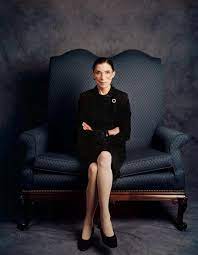
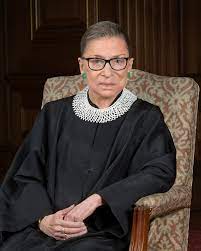
Associate Justice of the Supreme Court of the United States
Ruth Bader Ginsburg, born in 1933, was an Associate Justice of the Supreme Court of the United States from 1993 until her death in 2020. Appointed by President Bill Clinton, she was the second woman to serve on the Supreme Court. Ginsburg became known for her strong stance on gender equality and civil rights, and her sharp dissents in key cases, earning her the nickname “The Notorious RBG” among her admirers.
Before her judicial appointment, she argued several landmark cases on gender equality before the Supreme Court. Ginsburg’s career was marked by her advocacy for women’s rights and her fight against gender discrimination. Her intellectual rigor, her dedication to justice, and her trailblazing role as a woman in the legal profession have made her an iconic figure in American legal history.
Ruth Bader Ginsburg’s impactful tenure as an Associate Justice of the U.S. Supreme Court hence positions her among the 100 famous women who have profoundly influenced the American legal system.
36. Margaret Thatcher


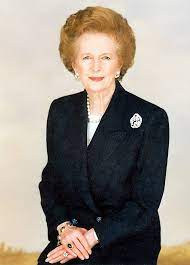
Prime Minister of the United Kingdom
Margaret Thatcher, born in 1925, was the Prime Minister of the United Kingdom from 1979 to 1990 and the leader of the Conservative Party from 1975 to 1990. She was the first woman to hold either position.
Thatcher’s policies and political style, which emphasized deregulation, privatization of state-owned companies, and reducing the power and influence of trade unions, led to significant economic changes in the UK and defined an era known as Thatcherism.
Her tenure also included the Falklands War and strong opposition to Soviet communism. Known as the “Iron Lady,” Thatcher remains a controversial figure, admired for her leadership and resolve but also criticized for her policies’ impact on certain sectors of society.
Margaret Thatcher’s leadership as the first female Prime Minister of the United Kingdom hence establishes her as one of the 100 famous women who reshaped British politics.
37. Rosa Parks



Civil Rights Activist
Rosa Parks, born in 1913, was an American civil rights activist widely known for her pivotal role in the Montgomery Bus Boycott. Her refusal to surrender her seat to a white passenger on a segregated bus in Montgomery, Alabama, on December 1, 1955, became a symbol of the modern Civil Rights Movement.
Moreover, Parks’ act of defiance and the subsequent boycott became powerful symbols in the struggle for racial equality and civil rights in the United States. She continued to be involved in civil rights issues and was honored with numerous awards, including the Presidential Medal of Freedom.
Rosa Parks is remembered as “the first lady of civil rights” and “the mother of the freedom movement.” Rosa Parks’ pivotal role in the civil rights movement and her courageous stance against racial segregation hence mark her as one of the 100 famous women who fought for equality.
38. Amelia Earhart
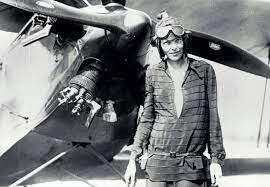


Aviation Pioneer and Author
Amelia Earhart, born in 1897, was an American aviation pioneer and author. Earhart was the first female aviator to fly solo across the Atlantic Ocean, a feat that earned her the United States Distinguished Flying Cross. She authored several best-selling books about her flying experiences and was instrumental in the formation of The Ninety-Nines, an organization for female pilots.
Earhart was known for promoting commercial air travel and women’s involvement in aviation. Her attempt to circumnavigate the globe in 1937 ended in her mysterious disappearance over the Pacific Ocean, a subject of intrigue and speculation to this day. Earhart’s courage and pioneering spirit have made her an enduring icon.
Amelia Earhart’s groundbreaking achievements in aviation and her contributions to literature secure her place among the 100 famous women who defied societal norms.
39. Rachel Carson
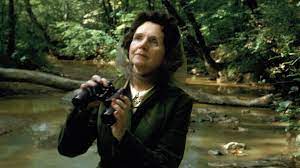

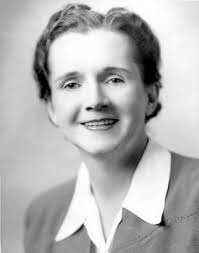
Environmentalist and Author
Rachel Carson, born in 1907, was an American marine biologist, author, and conservationist whose book “Silent Spring” and other writings are credited with advancing the global environmental movement.
Furthermore, Carson’s work brought environmental concerns to an unprecedented portion of the American public. “Silent Spring,” published in 1962, challenged the practices of agricultural scientists and the government and called for a change in the way humankind viewed the natural world.
Despite facing considerable industry backlash, Carson’s work spurred a reversal in national pesticide policy and led to a nationwide ban on DDT for agricultural uses. Her advocacy for the environment is considered a landmark in the development of the ecological consciousness.
Rachel Carson’s environmental activism and influential writings on conservation place her among the 100 famous women who advocated for the planet’s well-being.
40. Coretta Scott King


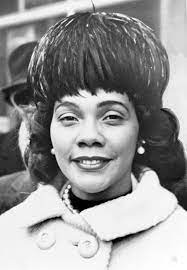
Civil Rights Activist and Wife of Martin Luther King Jr.
Coretta Scott King, born in 1927, was an American author, activist, and civil rights leader. Married to Martin Luther King Jr., she played a significant role in the African American Civil Rights Movement, often working alongside her husband. Following her husband’s assassination in 1968, she continued to be an active advocate for African American equality and became involved in the Women’s Movement and the LGBT rights movement.
King founded the King Center and sought to make her husband’s birthday a national holiday, achieving success when Martin Luther King Jr. Day was established. She remained a prominent figure in the struggle for civil and human rights until her passing in 2006. Above all, her tireless advocacy for civil rights and her partnership with Martin Luther King Jr. make her a central figure among the 100 famous women who fought for racial justice.
41. Shirley Chisholm

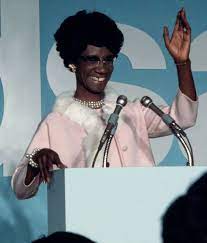

First African American Congresswoman
Shirley Chisholm, born in 1924, was an American politician, educator, and author. In 1968, she became the first African American woman elected to the United States Congress, representing New York’s 12th congressional district for seven terms from 1969 to 1983.
moreover, in the 1972 United States presidential election, she became the first African American candidate for a major party’s nomination for President of the United States, and above all the first woman to run for the Democratic Party’s presidential nomination.
Known for her outspoken advocacy and memorable quotes such as, “Unbought and unbossed,” Chisholm’s legacy includes both her work on minority education and employment opportunities and her pioneering role in breaking racial and gender barriers in American politics.
42. Barbara McClintock



Geneticist and Nobel Laureate
Barbara McClintock, born in 1902, was a groundbreaking American scientist and cytogeneticist who won the 1983 Nobel Prize in Physiology or Medicine for her discovery of genetic transposition. She is best known for her work on the genetics of maize (corn), demonstrating how genes can change positions on chromosomes.
Moreover, her work was critical to the development of our current understanding of genetic inheritance and the functioning of genes. McClintock’s research was initially met with skepticism but later gained widespread recognition, leading to her being hailed as one of the most significant geneticists of the 20th century. Her career is marked by her pioneering spirit in a field dominated by men and her profound impact on the study of genetics.
43. Mother Teresa


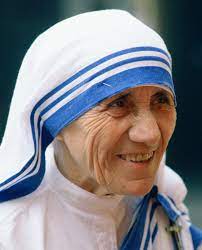
Nun and Missionary
Mother Teresa, born in 1910, was an Albanian-Indian Roman Catholic nun and missionary. She moved to India in 1929 and spent many years in Kolkata (formerly Calcutta), where she founded the Missionaries of Charity, a religious congregation dedicated to helping the low-income and sick.
Known for her compassion and dedication to the destitute and dying, Mother Teresa’s charitable work gained international recognition, leading to her receiving the Nobel Peace Prize in 1979.
For that reason, she became an icon of charitable work and a symbol of love and care for the less fortunate. Her canonization as a saint in 2016 by the Roman Catholic Church is a testament to her impact on the world.
44. Billie Holiday



Influential Jazz Musician
Billie Holiday, born in 1915, was an American jazz and swing music singer with a career spanning nearly thirty years. Nicknamed “Lady Day,” moreover she was known for her vocal delivery and improvisational skills. Holiday’s voice, strongly inspired by jazz instrumentalists, pioneered a new way of manipulating phrasing and tempo.
Her poignant renditions of songs, especially “Strange Fruit,” a powerful protest against racism, are legendary. Despite facing numerous challenges, including racial discrimination and personal struggles, Holiday’s music remains influential, and she is considered one of the greatest jazz vocalists of all time.
45. Marie-Thérèse Walter


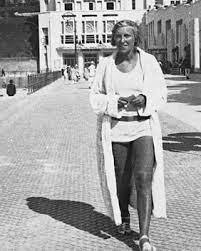
Model and Painter
Marie-Thérèse Walter, born in 1909, was a French model and painter, best known for her association with Pablo Picasso. She met Picasso in the late 1920s when she was just seventeen and became his lover and muse.
Walter’s relationship with Picasso had a profound influence on his art, as she inspired some of his most celebrated works during a particularly prolific period. While she was primarily known for her relationship with Picasso, Walter was also an artist in her own right.
Her influence extends beyond her role as a muse, as she contributed significantly to the personal and artistic life of one of the 20th century’s most influential artists.
46. Grace Hopper
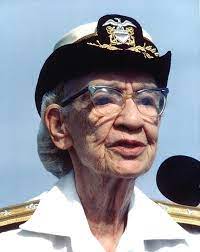
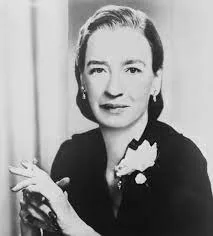

Computer Scientist and United States Navy Rear Admiral
Grace Hopper, born in 1906, was an American computer scientist and United States Navy rear admiral. A pioneering figure in the field of computer programming, she was one of the first programmers of the Harvard Mark I computer and developed the first compiler for a computer programming language.
Moreover her work on computer languages led to the development of COBOL, one of the first high-level programming languages. Hopper’s dedication to simplifying programming languages made computers more accessible and practical for everyday use.
Above all her contributions to computer science and her long career in the Navy earned her the nickname “Amazing Grace.” Hopper’s legacy continues to inspire many in the fields of computing and technology.
47. Malala Yousafzai



Advocate for Female Education and the Youngest Nobel Prize Laureate
Malala Yousafzai, born in 1997 in Pakistan, is a global advocate for female education and the youngest Nobel Prize laureate. She gained international recognition at a young age by writing a blog under a pseudonym for the BBC detailing her life under Taliban occupation and her views on education for girls.
In 2012, she was the victim of a failed assassination attempt by the Taliban because of her activism. Surviving the attack, Yousafzai continued to advocate for education, founding the Malala Fund, a non-profit organization dedicated to ensuring every girl has an opportunity to achieve a future she chooses.
Furthermore in 2014 she became the youngest-ever Nobel Peace Prize laureate in recognition of her efforts against the suppression of children and young people and for the right of all children to education.
Above all, her advocacy has had a significant global impact, making her a symbol of the fight for education and women’s rights.
48. Benazir Bhutto



First Female Prime Minister of Pakistan
Benazir Bhutto, born in 1953, was a Pakistani politician who served as the Prime Minister of Pakistan, becoming the first woman to head a democratic government in a majority Muslim nation.
Her political career was marked by both remarkable achievements and controversies. Bhutto was known for her charismatic authority and her efforts to modernize Pakistan. Despite facing opposition and challenges, including imprisonment and exile, she remained a significant figure in Pakistani politics.
Her leadership was cut short when she was assassinated in 2007. Bhutto’s legacy is a complex one, combining her role as a trailblazer for women in Muslim countries with her struggle for democratic values in Pakistan.
49. Maya Angelou



Poet, Singer, Memoirist, and Civil Rights Activist
Maya Angelou, born in 1928, was an American poet, singer, memoirist, and civil rights activist. Above all she is best known for her series of seven autobiographies, which focus on her childhood and early adult experiences, the first and most famous being “I Know Why the Caged Bird Sings.”
Angelou’s works are widely used in schools and universities worldwide for their themes of overcoming hardship and finding one’s identity and self-esteem.
Her participation in the civil rights movement and her collaboration with Martin Luther King Jr. and Malcolm X also marked significant chapters in her life. Angelou’s work in literature and her activism have made her an iconic figure in American culture.
50. Wangari Maathai
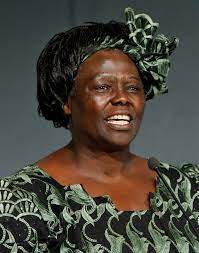
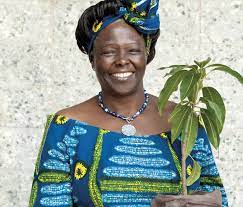

Environmental Political Activist and Nobel Laureate
Wangari Maathai, born in 1940 in Kenya, was an environmental and political activist and the first African woman to receive the Nobel Peace Prize in 2004. She founded the Green Belt Movement, an environmental non-governmental organization focused on tree planting, conservation, and women’s rights.
Maathai was a pioneering advocate for environmental conservation and sustainable development, particularly in her work to combat deforestation in Kenya. Her advocacy extended to political activism, where she campaigned for democratic rights and was outspoken against corruption.
Above all her life’s work significantly impacted environmental policy and practices in Kenya and inspired many in the global environmental movement.
51. Angela Merkel
Former Chancellor of Germany
Angela Merkel, born in 1954, served as the Chancellor of Germany from 2005 to 2021, making her the first woman to hold this position. A trained physicist, Merkel entered politics after the fall of the Berlin Wall in 1989.
Furthermore Merkel was known for her pragmatic leadership style and her handling of several crises, both within Germany and in the European Union, including the Eurozone crisis and the migrant crisis.
Her tenure was marked by a commitment to European unity, fiscal responsibility, and maintaining strong transatlantic relations. Merkel has been widely described as the de facto leader of the European Union and was one of the world’s most powerful women during her chancellorship.
52. Sally Ride
Astronaut and Physicist
Sally Ride, born in 1951, was an American astronaut and physicist and the first American woman to travel into space. She joined NASA in 1978 and made her historic space flight in 1983 aboard the Space Shuttle Challenger. Ride’s presence in the space program was a significant milestone in the inclusion of women in the field of space exploration.
After leaving NASA, she became a professor of physics at the University of California, San Diego, and founded an educational company aimed at encouraging children, especially girls, to pursue science and technology. Ride’s legacy continues to inspire generations of women to pursue careers in STEM fields.
53. Ellen Johnson Sirleaf
First Elected Female Head of State in Africa
Ellen Johnson Sirleaf, born in 1938, is a Liberian politician who served as the President of Liberia from 2006 to 2018. She was the first elected female head of state in Africa. A Harvard-educated economist and former World Bank employee, Sirleaf played a crucial role in transitioning Liberia out of a long period of civil war.
Furthermore her leadership was marked by efforts to rebuild the nation’s economy, infrastructure, and institutions. In 2011, she was awarded the Nobel Peace Prize for her efforts to further women’s rights. Sirleaf’s presidency was seen as a milestone for both African politics and female leadership globally.
54. Oprah Winfrey
Media Executive, Actress, Talk Show Host, Television Producer, and Philanthropist
Oprah Winfrey, born in 1954, is an American media executive, actress, talk show host, television producer, and philanthropist. She is best known for her talk show, “The Oprah Winfrey Show,” which was the highest-rated television program of its kind in history and ran in national syndication for 25 years, from 1986 to 2011.
Furthermore Winfrey is known for her ability to break down barriers, her powerful interviews, and her philanthropic efforts. She has been influential in shaping American culture and media and is one of the most influential women in the world. Winfrey’s journey from poverty to becoming North America’s first black multi-billionaire is a testament to her resilience, hard work, and entrepreneurial spirit.
55. Aung San Suu Kyi
Burmese Politician, Diplomat, Author, and Nobel Peace Prize Laureate
Aung San Suu Kyi, born in 1945, is a Burmese politician, diplomat, and author who won the Nobel Peace Prize in 1991. She is known for her non-violent struggle for democracy and human rights in Myanmar (formerly Burma). Suu Kyi spent nearly 15 years under house arrest for her efforts to bring democracy to her country. Furthermore she became an international symbol of peaceful resistance in the face of oppression.
However, her international reputation has suffered due to her government’s handling of the Rohingya crisis in Myanmar. Despite these controversies, she remains a significant figure in the struggle for democracy.
56. Elizabeth Blackwell
First Woman to Receive a Medical Degree in the United States
Elizabeth Blackwell, born in 1821, was a British physician and the first woman to receive a medical degree in the United States. She was a pioneer in promoting the education of women in medicine, facing considerable resistance and discrimination in her pursuit.
Furthermore in 1849, she became the first woman to graduate from medical school, earning her degree from Geneva Medical College in New York. Blackwell was also an active social and moral reformer in both the United States and in the United Kingdom. Above all, her contributions to the medical field and her role as a trailblazer for women in medicine have made her a significant figure in the history of women’s rights.
57. Diana, Princess of Wales
Member of the British Royal Family and Philanthropist
Diana, Princess of Wales, born in 1961, was a member of the British royal family as the first wife of Charles, Prince of Wales, who is the heir apparent to the British throne. She became an international icon of style, elegance, and charity work. Diana was celebrated for her compassionate activism, including her significant work in raising awareness about HIV/AIDS and her campaign against the use of landmines. Her openness about her personal life, including her mental health struggles, helped change public perceptions and brought attention to mental health issues. Her untimely death in a car crash in 1997 led to an unprecedented global outpouring of grief, and her legacy as a humanitarian and cultural icon continues to endure.
58. Shirin Neshat
Iranian Visual Artist
Shirin Neshat, born in 1957 in Iran, is a contemporary Iranian visual artist who primarily works in film, art, and photography. Neshat’s work is internationally acclaimed for its poetic and powerful visual narratives that explore themes of gender, identity, and society, particularly in the context of Islamic culture and the Iranian diaspora.
Her art often addresses the complex social and political realities that shape the identity of Muslim women. Through her compelling imagery, Neshat engages with issues of power, oppression, and femininity, making her one of the most prominent contemporary artists addressing these critical themes. Her works have been exhibited in major museums and galleries around the world.
59. Aung San Suu Kyi
Burmese Politician, Diplomat, Author, and Nobel Peace Prize Laureate
Aung San Suu Kyi, born in 1945, is a Burmese politician, diplomat, and author who was awarded the Nobel Peace Prize in 1991. She is known for her role as a leader in Myanmar’s (formerly Burma) struggle for democracy and human rights.
Suu Kyi spent nearly 15 years under house arrest for her opposition to the military junta that ruled Myanmar for decades. She became an international symbol of peaceful resistance in the face of oppression.
However, her international reputation suffered significantly due to her government’s treatment of the Rohingya Muslim minority in Myanmar, a situation described by many as ethnic cleansing. Suu Kyi’s life and career encapsulate the complex interplay of democracy, human rights, and politics in contemporary global affairs.
60. Elizabeth Blackwell
First Woman to Receive a Medical Degree in the United States
Elizabeth Blackwell, born in 1821, was a British physician and a pioneer for women in medicine, becoming the first woman to receive a medical degree in the United States. Her admission to medical school was initially a practical joke, but she persisted and graduated top of her class.
After earning her degree in 1849, Blackwell faced significant barriers in practicing medicine but continued to advocate for women in the field. She helped establish the New York Infirmary for Women and Children and later a women’s medical college to train female physicians.
Furthermore Blackwell’s perseverance and dedication opened doors for women in the medical profession and laid the groundwork for future generations.
61. Diana, Princess of Wales
Member of the British Royal Family and Philanthropist
Diana, Princess of Wales, born in 1961, was a member of the British royal family as the first wife of Charles, Prince of Wales, who is the heir apparent to the British throne. She became an international icon of style, elegance, and charity work.
Above all, Diana was celebrated for her compassionate activism, including her significant work in raising awareness about HIV/AIDS and her campaign against the use of landmines. Her openness about her personal life, including her mental health struggles, helped change public perceptions and brought attention to mental health issues.
Her untimely death in a car crash in 1997 led to an unprecedented global outpouring of grief, and her legacy as a humanitarian and cultural icon continues to endure.
62. Sandra Day O’Connor
First Woman Appointed to the United States Supreme Court
Sandra Day O’Connor, born in 1930, is a retired Associate Justice of the Supreme Court of the United States, appointed by President Ronald Reagan in 1981. She was the first woman to serve on the Court.
During her tenure, O’Connor was known for her case-by-case approach to jurisprudence and her often pivotal swing vote in important cases, especially on issues such as abortion rights and affirmative action.
Moreover her appointment was a significant milestone in women’s history in the United States and she played a crucial role in shaping the legal landscape of the country. O’Connor’s career on the Supreme Court left an indelible mark on American law and society.
63. Ellen DeGeneres
Comedian, Television Host, Actress, Writer, and Producer
Ellen DeGeneres, born in 1958, is an American comedian, television host, actress, writer, and producer. She first became prominent as a stand-up comedian and subsequently starred in the sitcom “Ellen” from 1994 to 1998, during which she became the first prime-time actress to come out as lesbian on television. DeGeneres later established herself as a television host with her syndicated talk show “The Ellen DeGeneres Show,” which ran from 2003 to 2021.
Known for her warm, relatable humor and her groundbreaking role in the representation of the LGBTQ community, DeGeneres has won numerous awards throughout her career, including multiple Emmys. She is also noted for her work in philanthropy and animal rights activism.
64. Gloria Steinem
Journalist and Social Political Activist
Gloria Steinem, born in 1934, is an American feminist, journalist, and social political activist who became nationally recognized as a leader and spokeswoman for the American feminist movement in the late 1960s and early 1970s.
Furthermore she co-founded several feminist organizations, including the National Women’s Political Caucus, the Women’s Media Center, and Ms. magazine, of which she was an editor. Her activism and writing have focused on issues of equality, gender roles, and child abuse.
Above all her work has been pivotal in the fight for women’s rights, and she remains an influential and inspiring figure in the feminist movement.
65. Hildegard von Bingen
Composer, Writer, and Polymath
Hildegard von Bingen, born in 1098, was a German Benedictine abbess, composer, writer, philosopher, Christian mystic, and polymath. She is known for her literary, musical, and scientific works, as well as her religious and diplomatic activities.
Hildegard’s compositions, which include both songs and liturgical dramas, are among the earliest known works of music by a woman. Her visionary theological texts and correspondence with influential political and religious figures of her time were highly unusual for a woman of her era.
Hildegard was also involved in scientific pursuits, writing about medicinal and botanical knowledge. She was canonized as a saint and is considered a Doctor of the Church, a title given to saints recognized as having made significant contributions to theology or doctrine.
66. Serena Williams
Professional Tennis Player and Entrepreneur
Serena Williams, born in 1981, is an American professional tennis player widely regarded as one of the greatest athletes of all time. She has won 23 Grand Slam singles titles, the most by any player in the Open Era, and has held the world No. 1 ranking in singles on several occasions.
Williams’ powerful playing style, combined with her longevity and success in the sport, has changed the face of tennis. Off the court, she is also known for her business ventures, including her own clothing line, and her advocacy for gender and racial equality in sports. Serena’s impact extends beyond tennis into cultural and social realms.
67. Florence Pugh
Actress and Humanitarian
Florence Pugh, born in 1996, is an English actress known for her roles in both independent films and major Hollywood productions. She gained recognition for her leading role in the drama “Lady Macbeth” (2016) and received critical acclaim for her performances in “Midsommar” (2019), “Little Women” (2019), and “Black Widow” (2021).
Above all Pugh has been praised for her versatility as an actress and her ability to bring depth and authenticity to her characters. In addition to her acting career, she is involved in humanitarian efforts, using her platform to raise awareness about various social issues.
68. Rachel Corrie
Activist and Human Rights Advocate
Rachel Corrie, born in 1979, was an American activist and human rights advocate. She was a member of the International Solidarity Movement (ISM), a pro-Palestinian organization involved in the Israeli-Palestinian conflict. Corrie gained international attention in 2003 when she was killed by an Israel Defense Forces (IDF) bulldozer in the Gaza Strip while protesting against the demolition of Palestinian homes.
Her death became a focal point for debates about the Israeli-Palestinian conflict and the role of international activists. Corrie’s activism and tragic death have made her a symbol of the global human rights movement.
69. J.K. Rowling
Author Best Known for the Harry Potter Series
J.K. Rowling, born in 1965, is a British author, best known for writing the “Harry Potter” fantasy series, which has become one of the most popular, critically acclaimed, and commercially successful book series in recent history. The series has sold over 500 million copies worldwide, been translated into multiple languages, and spawned a highly successful film franchise.
Rowling’s journey from a struggling single mother to a bestselling author is a remarkable story of perseverance and imagination. In addition to the Harry Potter series, she has written adult fiction and works under the pseudonym Robert Galbraith. Rowling is also known for her philanthropic efforts, particularly in support of children’s welfare and multiple sclerosis research.
70. Shirin Ebadi
Nobel Peace Prize Laureate and Former Judge in Iran
Shirin Ebadi, born in 1947, is an Iranian lawyer, former judge, and human rights activist. As one of the most famous women in Iran, she made history in 2003 by becoming the first Iranian to receive the Nobel Peace Prize. Ebadi’s impactful and pioneering efforts have primarily focused on promoting democracy and human rights, particularly in the realms of women’s, children’s, and refugee rights.
Despite being the first female judge in Iran and serving as the president of the city court of Tehran, her career faced setbacks after the 1979 Islamic revolution. Despite personal risks, Ebadi continues to be a vocal advocate for human rights and stands as a symbol of resilience in the face of adversity.
71. Misty Copeland
Trailblazing Ballerina
Misty Copeland, born in 1982, is an American ballet dancer for the renowned American Ballet Theatre (ABT). Considered one of the most famous women in the world of ballet, Copeland made history in 2015 by becoming the first African American woman to achieve the rank of principal dancer in ABT’s 75-year history.
Beyond her extraordinary accomplishments in ballet, Copeland is a prominent figure advocating for diversity and inclusion within the art form. Her trailblazing presence has inspired countless young dancers, particularly those of color, challenging traditional norms in an art world that has long been constrained by specific racial and body-type standards.
Copeland’s contributions extend beyond the stage, as she uses her platform as an author and public speaker to champion diversity in the world of ballet.
72. Yayoi Kusama
Influential Artist Known for Her Thematic Exhibitions
Yayoi Kusama, born in 1929, stands as one of the most influential artists of our time. Renowned for her unique contributions to contemporary art, Kusama works across various mediums, including sculpture, installation, painting, performance, film, fashion, and poetry.
As one of the most famous women in the art world, her distinctive style incorporates repetitive patterns, polka dots, and thematic expressions of her personal psychological struggles. Kusama’s immersive and often large-scale installations invite audience interaction, creating a profound impact on viewers.
Beyond her artistic endeavors, Kusama has been transparent about her mental health challenges, further emphasizing the intimate connection between her life and art. Her influence extends beyond the art world, making her a significant voice in avant-garde contemporary art.
73. Tarana Burke
Activist and Founder of the #MeToo Movement
Tarana Burke, born in 1973, has emerged as a pivotal figure in the fight against sexual abuse and harassment. As one of the most famous women in the realm of activism, Burke is the visionary behind the #MeToo movement.
Her impactful use of the phrase “Me Too” began in 2006, aiming to shed light on the pervasive nature of sexual abuse and assault in society. The movement gained global prominence in 2017 as a hashtag, providing a platform for women to share their experiences and expose the prevalence of sexual misconduct, particularly in the workplace.
Burke’s activism is centered on aiding survivors of sexual violence, with a particular focus on young women of color from low-wealth communities. Her work has not only raised awareness but has also empowered survivors, sparking a crucial dialogue about prevention and accountability.
74. Greta Thunberg
Environmental Activist
Greta Thunberg, born in 2003, is a Swedish environmental activist who is internationally known for her efforts to combat climate change. She gained global attention for initiating the “School Strike for Climate” movement in 2018, encouraging students to skip school to demand action on climate change.
Thunberg’s activism has included both speaking at the United Nations Climate Change Conference and addressing world leaders at various international forums.
She is known for her blunt, straightforward speaking manner, in which she criticizes world leaders for their failure to take sufficient action against climate change. Thunberg has inspired a worldwide movement of young people who are advocating for urgent action to address the climate crisis.
75. Indra Nooyi
Business Executive and Former CEO of PepsiCo
Indra Nooyi, born in 1955 in India, is a notable business executive best known for her role as the CEO of PepsiCo, one of the world’s leading food and beverage companies. Furthermore she served as the CEO from 2006 to 2019, and her tenure was marked by a focus on restructuring and diversifying the company’s product line, with an increased emphasis on healthier options.
Nooyi was one of the top female executives in the world during her time at PepsiCo and is known for her leadership, strategic thinking, and commitment to sustainability. She has been consistently ranked among the world’s 100 most powerful women and is celebrated for breaking glass ceilings in the corporate world.
76. Valentina Tereshkova
First Woman to Have Flown in Space
Valentina Tereshkova, born in 1937 in the Soviet Union, is a retired cosmonaut and engineer who became the first woman to fly in space in 1963 aboard the Vostok 6 mission. Her solo mission was a significant milestone in space exploration and the history of women in space.
Tereshkova orbited the Earth 48 times, spent almost three days in space, and remains the only woman to have been on a solo space mission. Her historic flight is celebrated for breaking gender barriers and contributing to the understanding of the effects of space travel on the female body.
Finally after her spaceflight, she became a prominent member of the Communist Party of the Soviet Union and a representative of the Soviet government. Now also part of the 100 famous women of history.
77. Toni Morrison
Nobel Laureate in Literature
Toni Morrison, born in 1931, was an American novelist, essayist, editor, teacher, and professor emeritus at Princeton University. She is best known for her powerful, poetically charged novels about African American life in the United States.
Her works include both “Beloved,” “Song of Solomon,” and “The Bluest Eye,” and are celebrated for their vivid dialogue, richly detailed characters, and epic themes of love, identity, and heritage. Morrison won the Nobel Prize in Literature in 1993, becoming the first African American woman to be selected for the award.
Furthermore, her writings offer a profound commentary on race and society in America, making her one of the most significant literary voices of her time.
78. Sacagawea
Lemhi Shoshone Guide
Sacagawea, born around 1788, was a Lemhi Shoshone woman who is best known for her role as an interpreter and guide for the Lewis and Clark Expedition. As a teenager, she was captured by the enemy and later married a French-Canadian trapper. Sacagawea was crucial to the success of the Lewis and Clark expedition, which mapped the western portion of the United States.
She helped the team navigate, gather food, and establish cultural contacts with Native American populations. Despite limited historical records about her life, Sacagawea is widely honored in the United States for her contributions as a young, resourceful Indigenous woman in American history.
79. Malinalli Tenépatl
Known as La Malinche
Malinalli Tenépatl, more commonly known as La Malinche, was a Nahua woman from the Mexican Gulf Coast who played a crucial role in the Spanish conquest of the Aztec Empire. Born around 1496, she became an interpreter, advisor, and intermediary for the Spanish conquistador, Hernán Cortés.
La Malinche was fluent in Nahuatl and Maya, and she learned Spanish quickly, becoming an invaluable asset to Cortés. Her role is complex and often controversial; she is seen by some as a traitor to her people, but by others as a victim or a figure who played a key part in a pivotal moment in Mexican history.
80. Wang Zhenyi
Astronomer and Poet
Wang Zhenyi, born in 1768, was a pioneering Chinese astronomer, mathematician, and poet during the Qing Dynasty. She broke traditional gender barriers by educating herself in fields such as astronomy, mathematics, geography, and medicine – areas typically inaccessible to women of her time.
Wang is most noted for her work in astronomy, where she explained complex subjects like lunar eclipses and the equinoxes in simple terms. Her astronomical works and poems reflect her dedication to science and her defiance of societal norms. As a female scholar in 18th-century China, Wang Zhenyi’s contributions to science and literature were both exceptional and inspiring.
81. Audrey Hepburn
Actress and Humanitarian
Audrey Hepburn, born in 1929, was a British actress and humanitarian. Renowned for her roles in classic films such as “Breakfast at Tiffany’s,” “Roman Holiday,” for which she won an Academy Award, and “My Fair Lady,” Hepburn was known for her elegance, charm, and acting prowess.
Beyond her acting career, Hepburn dedicated much of her life to humanitarian work. She was a Goodwill Ambassador for UNICEF, working in some of the most profoundly disadvantaged communities of Africa, South America, and Asia. Hepburn’s commitment to helping children around the world and her contributions to the arts have made her an enduring icon of both beauty and compassion.
82. Aretha Franklin
Singer, Songwriter, and Civil Rights Activist
Aretha Franklin, born in 1942, was an American singer, songwriter, and civil rights activist. Known as the “Queen of Soul,” Franklin is celebrated for her powerful voice and emotive delivery, which left an indelible mark on the music industry. Her hits, including “Respect,” “Think,” and “(You Make Me Feel Like) A Natural Woman,” have become anthems for the civil rights and women’s movements.
Franklin’s music career spanned several decades, during which she won numerous awards, including 18 Grammy Awards, and she became the first woman inducted into the Rock and Roll Hall of Fame. Her legacy as a musician and an advocate for civil rights and women’s empowerment remains influential.
83. Margaret Hamilton
Computer Scientist
Margaret Hamilton, born in 1936, is an American computer scientist and systems engineer. She played a pivotal role in the development of on-board flight software for NASA’s Apollo missions. Hamilton led the Software Engineering Division of the MIT Instrumentation Laboratory, which developed the onboard flight software for the Apollo space program.
Her work was crucial in landing astronauts safely on the Moon, particularly during the Apollo 11 mission. Hamilton’s contributions laid the groundwork for many concepts in software engineering today, and she is credited with coining the term “software engineering.” She is celebrated for her achievements in a field that was, at the time, predominantly male.
84. Madeleine Albright
First Female United States Secretary of State
Madeleine Albright, born in 1937, was an American diplomat and politician who served as the first female United States Secretary of State from 1997 to 2001 under President Bill Clinton. Born in Prague, Czechoslovakia, she immigrated to the United States in 1948. As Secretary of State, Albright was instrumental in shaping American foreign policy in the post-Cold War era, advocating for human rights and democracy worldwide.
She played a significant role in NATO’s intervention in Kosovo and in the efforts to expand NATO and the European Union. Albright’s tenure as Secretary of State was marked by her strong will, deep knowledge of international affairs, and her commitment to democratic principles.
85. Toni Collette
Award-Winning Actress and Producer
Toni Collette, born in 1972, is an Australian actress and producer known for her versatility and depth in both comedy and drama. She gained international recognition for her performance in “The Sixth Sense” and received an Academy Award nomination for her role. Collette’s other notable works include both “Little Miss Sunshine,” “Hereditary,” and “Muriel’s Wedding,” showcasing her ability to portray a wide range of characters.
Her performances have been consistently praised, and she has received several prestigious awards and nominations. Collette’s work extends to television, where she has starred in critically acclaimed series like “United States of Tara.” She is also known for her work as a producer, taking on projects that often explore complex and dynamic female characters.
86. Chimamanda Ngozi Adichie
Writer and Feminist
Chimamanda Ngozi Adichie, born in 1977, is a Nigerian writer and feminist. She has gained international acclaim for her novels, essays, and speeches, particularly for works like “Half of a Yellow Sun,” “Americanah,” and “We Should All Be Feminists.” Her writing often explores themes of identity, feminism, race, and the African diaspora experience.
Adichie, part of the 100 Famous Women, is known for her eloquent and compelling exploration of the complexities of life, both in Nigeria and the United States. Her TED talk “The Danger of a Single Story” and her book “We Should All Be Feminists” have contributed significantly to contemporary discussions on feminism and cultural understanding. Adichie’s work has inspired a new generation of feminists and writers around the globe.
87. Jane Goodall
Primatologist, Ethologist, and Anthropologist
Jane Goodall, born in 1934, is a British primatologist, ethologist, and anthropologist, best known for her groundbreaking research on chimpanzees in Gombe Stream National Park, Tanzania. Goodall’s 60-year study of wild chimpanzees has redefined the relationship between humans and animals in the field of science.
She observed tool-making and other complex behaviors in chimpanzees, challenging previous beliefs about the exclusivity of human capabilities. Goodall’s work has extended to conservation and animal welfare issues, and she founded the Jane Goodall Institute to support ongoing research and conservation efforts. Her dedication to science and conservation has made her a global icon in the effort to protect both animals and their habitats.
88. Temple Grandin
Professor of Animal Science and Advocate for Autistic Communities
Temple Grandin, born in 1947, is an American professor of animal science and a prominent advocate for autistic communities. Grandin, who is herself autistic, has made significant contributions to the understanding of animal behavior and to the humane treatment of livestock.
Her insights into animal behavior have led to innovations in the design of livestock handling facilities. Grandin has also been a vocal advocate for autism awareness and neurodiversity, sharing her experiences through writing and speaking engagements. Her life and work have been instrumental in changing perceptions of both autism and animal welfare.
89. Marta Vieira da Silva
Professional Footballer
Marta Vieira da Silva, born in 1986 in Brazil, commonly known as Marta, is a professional footballer often considered the best female player of all time. She has been named FIFA World Player of the Year six times and has played for various clubs around the world, as well as the Brazilian national team.
Marta is known for her exceptional skill, speed, and goal-scoring ability. She has been a trailblazer in women’s football, breaking numerous records and inspiring a generation of female athletes. Her impact on the sport extends beyond her playing achievements, as she has been an advocate for gender equality in sports.
90. Ellen Ochoa
Astronaut and Former Director of the Johnson Space Center
Ellen Ochoa, born in 1958, is an American engineer, former astronaut, and the former director of the Johnson Space Center. Ochoa became the first Hispanic woman to go to space when she served on a nine-day mission aboard the Space Shuttle Discovery in 1993.
She flew on four space shuttle missions and has logged nearly 1,000 hours in orbit. After her spaceflights, Ochoa held several management positions at NASA, culminating in her role as the second female and first Hispanic director of the Johnson Space Center. Ochoa’s career at NASA and her achievements in space exploration have made her a role model for women and Hispanics in STEM fields.
91. Anne Frank
Diarist and Writer During the Holocaust
Anne Frank, born in 1929 in Frankfurt, Germany, is one of the most discussed Jewish victims of the Holocaust. Known for her diary, “The Diary of a Young Girl,” which documents her life in hiding from 1942 to 1944, during the German occupation of the Netherlands in World War II. Anne’s account provides a deeply personal perspective of the Holocaust through the eyes of a young Jewish girl.
Her honest and heartfelt writing has made her diary one of the world’s most widely read books and has been the basis for several plays and films. Anne Frank died in the Bergen-Belsen concentration camp in 1945. Her diary endures as a symbol of resilience, the human spirit, and the need to never forget the horrors of the Holocaust.
92. Mother Jones
Labor and Community Organizer
Mary Harris “Mother” Jones, born in 1837, was a prominent labor and community organizer in the United States. She became a leading figure in the labor movement, advocating for workers’ rights, including fighting against child labor and for fair wages and safe working conditions.
Jones was known for her fiery rhetoric and tenacious activism, which earned her the moniker “Mother” Jones. She co-founded the Industrial Workers of the World, and her efforts significantly influenced the labor movement of the early 20th century. Mother Jones remains a symbol of social justice and tireless commitment to the rights of workers.
93. Jhumpa Lahiri
Author
Jhumpa Lahiri, born in 1967, is an American author of Indian descent known for her short stories, novels, and essays. Her debut collection of short stories, “Interpreter of Maladies,” won the Pulitzer Prize for Fiction in 2000. Lahiri’s work often explores themes of identity, immigration, and the Indian-American experience.
Her notable works include both the “The Namesake” and “Unaccustomed Earth.” Lahiri’s evocative writing style, deep character exploration, and treatment of diaspora and cultural intersections have made her a significant figure in contemporary literature.
94. Rita Levi-Montalcini
Nobel Laureate in Physiology or Medicine
Rita Levi-Montalcini, an Italian neurobiologist, was awarded the Nobel Prize in Physiology or Medicine in 1986, shared with colleague Stanley Cohen, for their discovery of nerve growth factor (NGF). Her research provided fundamental insights into cell growth and development.
Despite facing significant obstacles during World War II due to being Jewish, she set up a laboratory in her bedroom and continued her research. Levi-Montalcini’s career was marked by her resilience and dedication to science, making her one of the most prominent neuroscientists of the 20th century.
95. Helen Keller
Author, Political Activist, and Lecturer
Helen Keller, born in 1880, was an American author, political activist, and lecturer. She was as a matter of fact the first deaf-blind person to earn a Bachelor of Arts degree. Very impressive especially given her huge milestones reached. Her life and education with her teacher, Anne Sullivan, were famously dramatized in the play and film “The Miracle Worker.”
Keller’s activism and writing, including her autobiography “The Story of My Life,” have made significant impacts on the world’s perception of the capabilities of people with disabilities. Moreover, she co-founded the American Civil Liberties Union and campaigned for women’s suffrage, labor rights, and other causes, becoming an iconic figure in multiple social justice movements.
96. Gabriela Mistral
Poet-Diplomat, Educator, and Feminist
Gabriela Mistral, a pseudonym for Lucila Godoy Alcayaga, was a Chilean poet-diplomat, educator, and feminist. In 1945, she became the first Latin American author to receive the Nobel Prize in Literature. Her poetry, which deals with themes of love, sorrow, nature, and Latin American identity, is celebrated from time to time for its emotional power and lyrical beauty.
Mistral also worked as an educator and a cultural minister, advocating for the rights of women, children, the low-income, and the dispossessed. Her legacy as a poet and a humanist has left a significant mark on Latin American literature and culture.
97. Annie Oakley
Sharpshooter and Exhibition Shooter
Annie Oakley, born Phoebe Ann Mosey in 1860, was an American sharpshooter and exhibition shooter. Her incredible skill with both a rifle and shotgun made her a national celebrity in Buffalo Bill’s Wild West show, a late-19th-century variety show that depicted scenes from the American frontier.
Oakley was a trailblazer for women in the male-dominated field of shooting and became an American folk hero. She was known for her feats of marksmanship, performed before large crowds and royalty across Europe. Her legacy as a talented sharpshooter and a symbol of the American West endures in popular culture.
98. Mae Jemison
Engineer, Physician, and Former NASA Astronaut
Mae Jemison, born in 1956, is an American engineer, physician, and former NASA astronaut. She made history in 1992 when she became the first black woman to travel into space aboard the Space Shuttle Endeavour.
After her time in space, Jemison has been an advocate for science education, particularly encouraging underrepresented students to pursue science and technology careers.
She has founded several organizations and initiatives to further science literacy and has been a prominent figure in promoting diversity in STEM fields.
99. Kamala Harris
Vice President of the United States
Kamala Harris, born in 1964, is the Vice President of the United States, serving since January 2021. She is the first female vice president, the highest-ranking female official in U.S. history, and the first African American and first Asian American vice president.
Before her vice presidency, Harris served as the U.S. Senator from California and the Attorney General of California. Her career has been marked by several barriers-breaking moments, reflecting her role as a trailblazer in American politics.
Harris’s tenure both as Vice President and role model is significant for its historic nature and for the representation and inspiration it provides to women and underrepresented groups across the United States and beyond.
100. Mary Barra
Businesswoman and CEO of General Motors
Mary Barra, born in 1961, is an influential businesswoman who has served as the chairman and CEO of General Motors (GM) since 2014. Her appointment as CEO marked the first time a woman led a major automaker, and why she is part of the 100 Famous Women mentioned.
Under Barra’s leadership, GM has focused on building electric and self-driving cars, positioning the company at the forefront of innovation in the automotive industry. Barra has been recognized for her leadership and vision in the traditionally male-dominated field of automotive manufacturing.
Her career at GM, where she started as an intern at the age of 18, is noted for her commitment to quality, sustainability, and innovation.
The Future of The Most Famous Women
Firstly, the stories of “famous women in history” remain not just as echoes of the past but as clarions for the future. They remind us that every act of courage, every breakthrough, every artistic masterpiece feeds into the narrative of progress that continues to unfold.
Secondly, In the digital age, the legacies of these famous women gain new life, spreading through the infinite channels of the internet, sparking movements, and empowering the next generation. As we optimize our content for SEO with keywords like “famous women who changed the world” and “famous women actors,” we do more than rank on search engines; we ensure that the tales of these formidable women remain at the forefront of our cultural conversation.
Lastly, with each retelling of their stories, with every search query that seeks to uncover their histories, we pay homage to the famous women who have blazed trails and shattered ceilings






